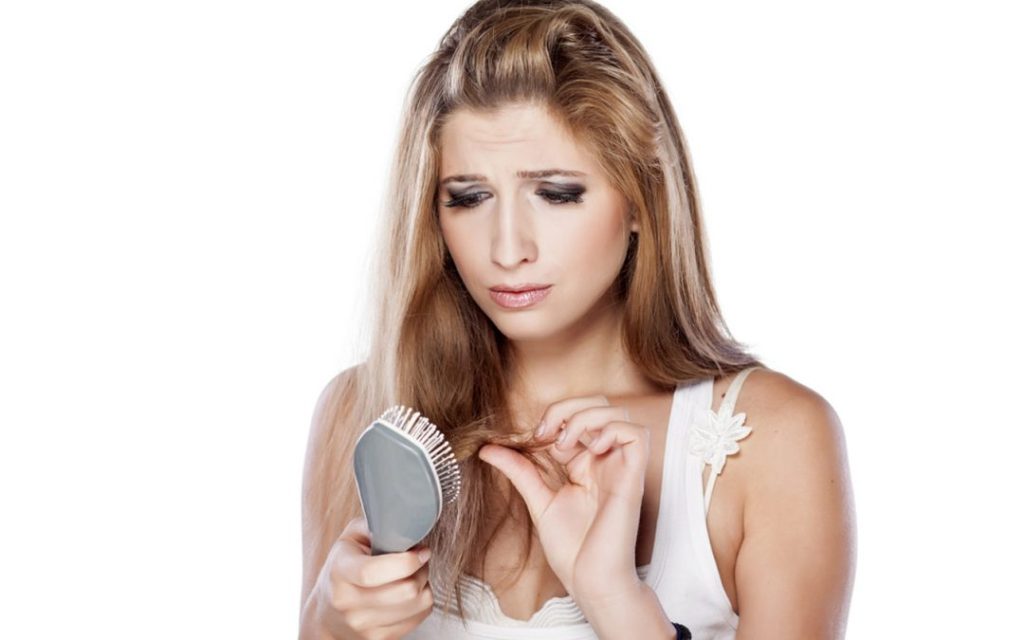10 Reasons for Female Hair Loss, And What To Do About It

10 Reasons for Female Hair Loss, And What To Do About It
Whether your dream hairstyle is long and flowing or short and spunky, thinning hair and hair loss are not your friends. Hair loss is typically associated with men (thanks to male pattern baldness) but it also happens to women. Because your hair is so often considered a personal mark of your beauty, falling out or thinning hair can be very demoralizing. But luckily, there are many simple ways to treat it! Here are some of the common reasons for female hair loss and what you can do to take back your locks.
Reason #1: Physical Stress
Physical trauma, from surgery to car accidents to illnesses, can cause temporary hair loss called telogen effluvium. Your hair has a natural life cycle of growth, rest, shedding, and new growth. A physically traumatic event can throw off that pre-programmed cycle, and more of your hair may be pushed into the shedding phase before its time. The hair loss becomes noticeable three- to six- months after the trauma, but it is temporary. As your body recovers, your hair will start growing back.
Reason #2: Pregnancy
Another example, though hopefully not considered traumatic, of physical stress that can cause hair loss is pregnancy. Many women notice some hair loss after their baby has been delivered. Your body considers giving birth a traumatic physical event, and you are likely to see the same hair loss and recovery hair growth as you would with any of the above physical stress incidents. It is perfectly normal and temporary.
Reason #3: Too Much Vitamin A
A balanced vitamin regimen is essential to healthy hair, but the word is balanced. Overdoing certain vitamins and minerals can do more harm than good. Too much vitamin A (recommended daily value is 5000 IU) can trigger hair loss. If you have been taking in too much vitamin A through supplements or medication and experience hair loss, bring your vitamin A levels down to the recommended amount and you should see your hair growing back normally.
Reason #4: Too Little Protein
Your body needs protein to build your hair. But your body also considers hair a cosmetic luxury, so if it isn’t getting enough protein it will begin to ration the protein it does have by shutting down hair growth. It takes a few months of protein deficiency for the ceasing hair growth to be noticeable. The fix is easy: Add more protein sources to your diet. The best sources of protein are meat, fish, and eggs, but there are also some excellent plant-based sources of protein like peas, quinoa, and nuts.
Reason #5: Vitamin B Deficiency
Too much vitamin A may cause hair loss, but so does too little vitamin B. Vitamin B deficiency is less common in the United States than in more developing countries, but if you do find that your vitamin B levels are low, incorporate a supplement or vitamin B rich foods. Some examples of natural vitamin B sources are fish, meat, non-citrus fruits, and starchy vegetables.
Reason #6: Genetics
Male pattern baldness has a female counterpart: androgenetic alopecia, more commonly called female pattern hair loss. Androgenetic alopecia is passed down through your female ancestors, so if the women in your family show a widening part or thinning hair at a certain age, you may expect the same. Just like for men, mioxidil (Rogaine) can help you either grow hair or maintain the hair you have and is available over the counter.
Reason #7: Female Hormones
Changing hormone levels (can be from pregnancy, switching/going off/going on birth control, or menopause) can cause hair loss. When androgen receptors on your scalp are activated, the hair follicles miniaturize and the hair falls out. Talk to your doctor about any prescriptions you are taking and their possible hair loss side effects.
Reason #8: Emotional Stress
Your body sometimes reacts to emotional stress—death of a loved one, divorce, sudden life change—similarly to physical stress, and this reaction can include hair loss. More often, though, emotional stress will exacerbate an already existing hair loss problem rather than cause a previously non-existent one. As the emotional stress dissipates, so will your hair loss. Exercise, therapy, and reaching out for support can help lower emotional stress levels.
Reason #9: Anemia
One in ten women suffers from anemia at some point between 20 through 49 years old, typically due to iron deficiency. (While iron deficiency is commonly thought of as the only cause of anemia, there are other less common causes.) A symptom of anemia is hair loss, along with fatigue, headache, dizziness, pale skin, and cold hands and feet. Ask your doctor for a blood test to determine if you have this type of anemia; a simple iron supplement may be all that’s needed.
Reason #10: Hypothyroidism
Your thyroid is a little gland in your neck that produces hormones to regulate your metabolism, growth, and development. If your thyroid isn’t producing enough of these hormones, you may have hypothyroidism (an underactive thyroid gland) and may notice hair loss. Like anemia, your doctor will need to run a test to determine your thyroid’s activity level and prescribe synthetic thyroid medication, and you’ll see your hair return to normal.